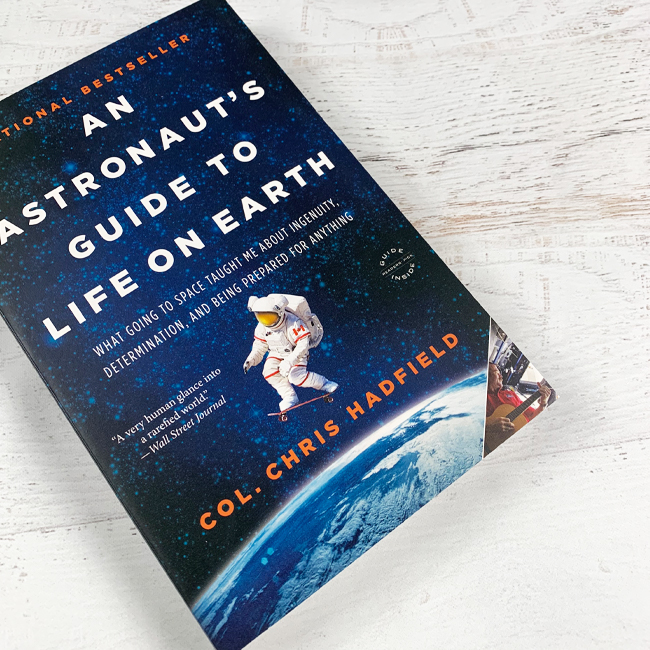Hi Online Book Clubbers!
Was this book not perfect for the time we were in? It was all about isolation and quarantine that trumped anything we could have experienced during Covid-19! Looking forward to hearing all of your thoughts!
Here are some questions to get the conversation started.
.
An Astronaut’s Guide to Life on Earth by Col. Chris Hadfield
- Chris Hadfield was determined to become an astronaut by the age of 9-years-old. What did you think of his young determination? Have you had a goal carry you through your entire life, like Hadfield?
- Hadfield had a very supportive spouse. How important is it to have a life partner that aligns themselves with your vision? Do you think that would be extra important in an astronaut’s line of work?
- When you heard Hadfield’s description of being an astronaut, especially when he explained the ratio of prep time versus time in orbit, did the job seem appealing to you? Were you aware beforehand of what being an astronaut really entailed?
- This book emphasized the need to be ready, work hard, and enjoy your experiences. On top of that, the need to be over-prepared was heavily discussed. Although that makes sense for space travel, do you think it holds true for experiences on earth? Are you the type of person who likes to be over-prepared for situations that may arise?
- In life you often hear about positive thinking, especially in the self-betterment genre that currently exists. Hadfield talks about the opposite of this – he says there is power in negative thought (sweating the small stuff is a good thing), because it requires you to make a plan for if something goes wrong. Do you agree with him on this? Are you more on ‘team positive thinking’ or ‘team negative thinking’?
- Hadfield talks about how early success is a terrible teacher [I like to think I’ve had this thought many times before Chris]. His thought is that if you are rewarded for lack of preparation, you won’t learn how to work hard, or even to work hard when it’s necessary. Do you agree? What are some other examples of areas where early success can cause problems in the long run?
- The theme of isolation is very prevalent in this book. There was also periods of quarantine that were described, in order to prevent illness before space travel (the backup crew was also required to quarantine). Did you take anything from this experience that related to your experience during the Covid-19 pandemic?
- When Hadfield thought he wouldn’t go to space for a third time, he still put in the work that he needed to, setting his mind on the journey and not the destination. That is a very powerful lesson. Have you ever had an experience like that, where so much was required of you, even though the destination may not have been the outcome you desired?
- Because the chance of death is so high with space travel, full effort is required at all times, right up until descent (and with the intense recovery afterwards). What area of your life do you/can you carry that effort forward into?
- What role did social media play later in Hadfield’s career? How have his videos benefitted students and those interested in space?
- Did this book make you think about your individual role in our environmental impact?
- What did Hadfield mean when he talked about being a “zero” instead of a “plus one” (and always being willing to learn from others)? Have you come across anyone that is a zero or a plus one, by Hadfield’s definition?

Hadfield said, “A funny thing happened on the way to space: I learned how to live better and more happily here on Earth.” I’m so grateful he shared his wisdom with us, because after hearing what it takes to become an astronaut and actually head to space, I know I won’t be making my way there anytime soon (or ever). This is a rare thing for me to say, but I think I would have enjoyed this book even a little bit more as an audio book, not only because I love Chris Hadfield’s voice, but because the astronaut lingo would have flowed well coming from the expert himself. I love the gentle reminders in this book to enjoy all that our beautiful Earth has to offer, to respect our planet, and to work hard in everything we choose to do. Hadfield also said, “If you start thinking that only your biggest and shiniest moments count, you’re setting yourself up to feel like a failure most of the time.” He reminds us to savour all the small stuff in life…and I hope we can all carry that lesson forward into our day, week, month, and life!! I’m giving this book 3/5.
Thanks for joining in on Book Club! Stay tuned for my next book selection.
